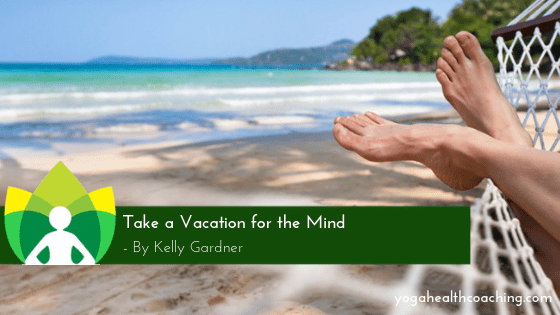
Take a Vacation for the Mind
Ah, vacation…
A week away from the stress of daily living. Time with friends. Time outside.
Vacation helps us to recharge and feel great in our bodies and our minds. To settle and feel more at ease.
This summer, my husband and I were fortunate enough to go on vacation with some friends to an island on the East Coast. We ate fresh seafood and produce, lots of vegetables and lighter fare. We got daily exercise by walking for miles on the beach, playing for hours in the waves of the ocean, and riding a bike along the trails. We played games with our friends and had quality conversations away from electronics. We went to bed early and experienced sound sleep after a long day of outdoor activity. And I rose early in the mornings to sit outside in silence and listen to the sounds of the island.
It’s really no wonder that this type of vacation helps us to feel so great. With a laid-back schedule of space and freedom, we are resetting our nervous system to match the rhythms of nature by allowing ourselves to step out of our busy schedules and fall into the calmness of just being. We are typically also more mindful on vacation to enjoy every moment, to soak up time with those we are with, and to purposefully check out from the stress of work and home. Our bodies and minds get time to expand, release, and relax.
But alas, all vacations must come to an end.
 What if we could give ourselves a vacation from the stress and anxiety that comes with daily living without going anywhere? By mindfully planning the habits we practice daily, we can do just that. If we set our schedule up to support aligning our habits with the rhythm of nature, our nervous system can feel better every day and we can experience less stress and anxiety. Mindfully creating our daily schedule can set us up for happier and healthier lives in which we experience more of that refreshed vacation feel every day.
What if we could give ourselves a vacation from the stress and anxiety that comes with daily living without going anywhere? By mindfully planning the habits we practice daily, we can do just that. If we set our schedule up to support aligning our habits with the rhythm of nature, our nervous system can feel better every day and we can experience less stress and anxiety. Mindfully creating our daily schedule can set us up for happier and healthier lives in which we experience more of that refreshed vacation feel every day.
Routine is a great way to calm the nervous system. Patterns in our schedule help the brain and body feel more secure and stable by knowing what to expect and reducing the amount of decision-making involved in daily living. It’s almost as if we can approach our nervous system like a child. Too many decisions and too much stimulation will frazzle and fray our nervous system. We can actually fall victim to decision fatigue and by the end of a long day or by the end of the week, we are making poorer decisions and giving in to things that are not moving us closer to our goals. This, along with the responsibilities and stressors we are faced with as adults, can push us over the edge and into desperate need of a break. If we can automate our habits, we free up energy that we would be using to make little decisions and this freedom adds up. We are also guaranteeing ourselves a better chance of continuing with the choices we feel good about rather than rolling the dice on whether or not we will follow through when we are mentally and physically drained.
As a mental health therapist, my patients are often puzzled when I start digging into their daily routines and prescribing schedule changes to support mental health. There are small adjustments we can make to our schedules to enable increase in daily peace. We must be able to step back and assess if our schedule is working against how we want to feel. Because our identity is so closely tied to what we do repeatedly day after day, it is of utmost importance to create a schedule that will allow us to find ease in our minds and bodies. We have the ability to feel our best if we take the time upfront to do the planning.
Eating our meals at the same time every day and drinking only water between meals can make a huge difference. When we eat our meals at regular times, our bodies can stop wondering when the next round of nourishment will come and how to allocate the nutrients from the last. Fasting between meals can help the digestive and nervous systems to have time to rest and restore, setting us up for optimal digestion, absorption, and elimination along with more peace of mind in the absence of constant internal stimulation. The adjustment of transitioning from a grazer to an intermittent faster can end up being more of a mental challenge than a physical one, so mindfully noticing the stories we tell ourselves is also helpful.
Next, setting our bed and rise times for the same time every day can help to reset our circadian rhythms. This enables the body and the brain to know when to rise and shine so that we awake ready to face the day and when to reset and rejuvenate so that we experience restful sleep. Consistent bed and rise time- even on weekends- can help us to more easily get out of bed in the morning every day rather than depending on caffeine so heavily or battling with the snooze button for the first few days of every week. Our bodies weren’t created with a workday/weekend schedule in mind, so winding down at the same time every day can help us to more easily fall asleep and feel more rejuvenated the next day.
It may sound boring to settle into a rhythm of eating and sleeping at the same times every day, but the calming effects on the nervous system are well worth it. And we will find that we have more energy and better concentration to boot. Getting our bodies realigned with their natural rhythms can help us live with more joy and the enthusiasm of feeling good every day. What’s boring about that?!
For this vacation effect, we don’t even have to save up money or count down the days. We can start immediately and feel better in our bodies, minds, and lives right now. Join a group who is already working on the habits, start a book club, or try reaching out to others who are interested in shifting the way they feel as well. Start with small changes and see how you feel. Think about how your daily schedule is different on a vacation or how your ‘perfect’ day would look and take steps to make that a reality.
See what changes you can make in the next week and what works or what doesn’t. Comment below and let me know how it’s going. I will be trying right along with you.



